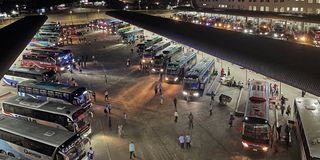Holiday Travel Crisis: Passengers hit with inflated fares, ticket scams

What you need to know:
- Desperation has gripped many, with some passengers forced to make unofficial agreements with middlemen, who have taken advantage of the soaring demand to exploit travelers.
Dar es Salaam. The festive season has turned Tanzania’s Magufuli Bus Terminal into a chaotic scene as hundreds of travellers scramble for tickets to upcountry destinations.
Desperation has gripped many, with some passengers forced to make unofficial agreements with middlemen, who have taken advantage of the soaring demand to exploit travelers.
A businesswoman heading to Mwanza, Ms Amina Juma, is among those caught in the struggle.
“They are refusing to sell tickets in advance because middlemen want to make money from this situation,” she said, her frustration evident.
“I’ve had to pay almost double the fare to secure a ticket,” she added.
The Land Transport Regulatory Authority (Latra)’s official fare for an ordinary bus from Dar es Salaam to Mwanza is Sh55,000, while semi-luxury buses charge Sh78,000.
According to The Citizen’s survey conducted on December 21, passengers are now paying between Sh90,000 and Sh170,000, depending on the bus class.
Middlemen, lurking around the terminal, have turned this into a lucrative business, charging hefty commissions for tickets.
The Magufuli Bus Terminal has become a hub for middlemen who negotiate prices outside the official fare structures.
These middlemen approach passengers desperate for a way home and offer tickets at inflated prices that are not even reflective of the electronic receipt offered.
“I’ve been here since morning trying to get a ticket to Arusha,” said Michael Komba, a college student.
“When I couldn’t find one, a middleman approached me, saying he could get a seat if I paid an extra Sh25,000. I had no choice,” Komba added.
The official fare from Dar es Salaam to Arusha is Sh30,000 for an ordinary bus and Sh42,000 for a semi-luxury bus. Now, passengers are paying between Sh55,000 and Sh70,000 for the same route.
However, such people claim they are helping travellers, but many passengers view them as opportunists worsening an already dire situation.
For others, the middlemen’s involvement is both a blessing and a curse. Ms Zainabu Hamis, a mother traveling to Tarime with her two children, said the ‘helpers’ made her journey possible but at a high cost.
“I was almost ready to give up,” she said, adding, “A helper found tickets for me, but I had to pay Sh120,000 for each seat instead of the Sh64,000 official fare. At least now I can travel.”
For routes like Tarime, passengers are now paying as much as Sh190,000 for semi-luxury buses, far above the official fares.
Others, like Joseph Matiko, a farmer heading to Morogoro, have simply given up. “The buses prioritise long-distance travellers,” he said.
“I’ve been waiting for hours, and the middlemen told me to pay double the fare. I can’t afford that,” he added.
The regulator has acknowledged the challenges but insists passengers have to play their part in addressing the issue.
Latra’s head of public relations and communication, Mr Salum Pazzy, said the authority was conducting daily patrols to curb malpractice.
“Passengers are partly to blame because they agree to pay inflated fares and make informal agreements with transporters,” Mr Pazzy explained.
“For example, a ticket might officially cost Sh42,000, but a passenger agrees to pay Sh45,000, with the extra amount unrecorded. We need their cooperation to stop this,” he said.
Latra is also educating passengers about the importance of paying only the official fare and reporting any violations. However, enforcing this during the festive rush remains a daunting task.
“There is no transport shortage,” Pazzy added. “The railway services have eased pressure on buses. We urge passengers to verify fares through our platforms and ensure they travel on compliant buses,” he added.
Back to the Magufuli Bus Terminal, the situation shows no sign of improving. Travellers are seen haggling with middlemen, many visibly stressed as they weigh the cost of tickets against their limited budgets.
“It’s a yearly problem,” said George Mkwawa, a trader heading to Dodoma. “But this time, it feels worse. I’ve spent hours negotiating with middlemen. They hold all the power here,” he added.
The festive season’s transport crisis has revealed gaps in the regulation of fares and ticket sales.
While the authority’s efforts to manage the situation are ongoing, the reality at Magufuli Bus Terminal reflects the challenges of balancing demand, supply, and enforcement.
For now, passengers are left to navigate the chaos, hoping for a smoother journey in the future.




